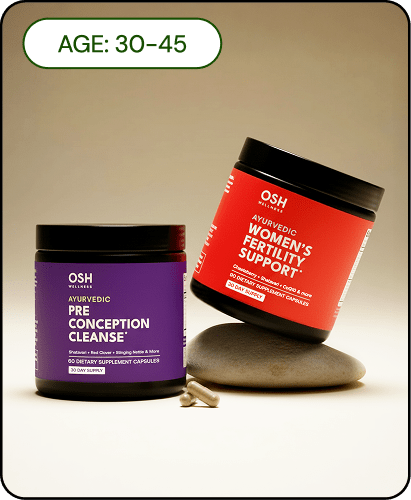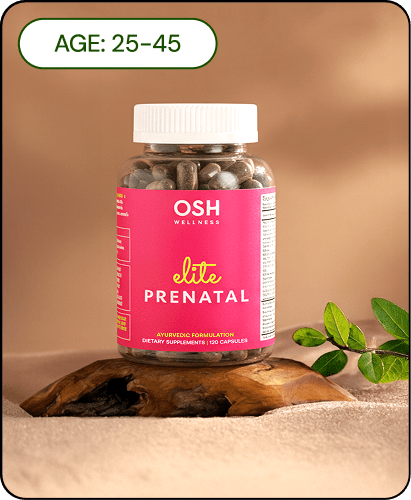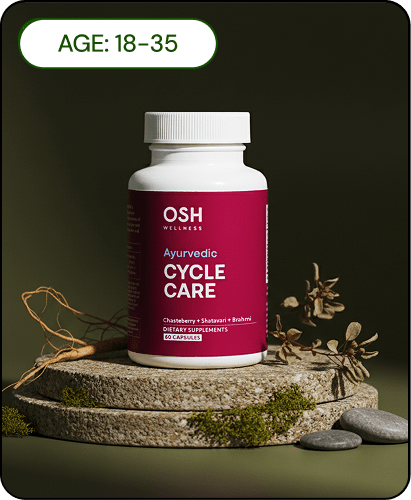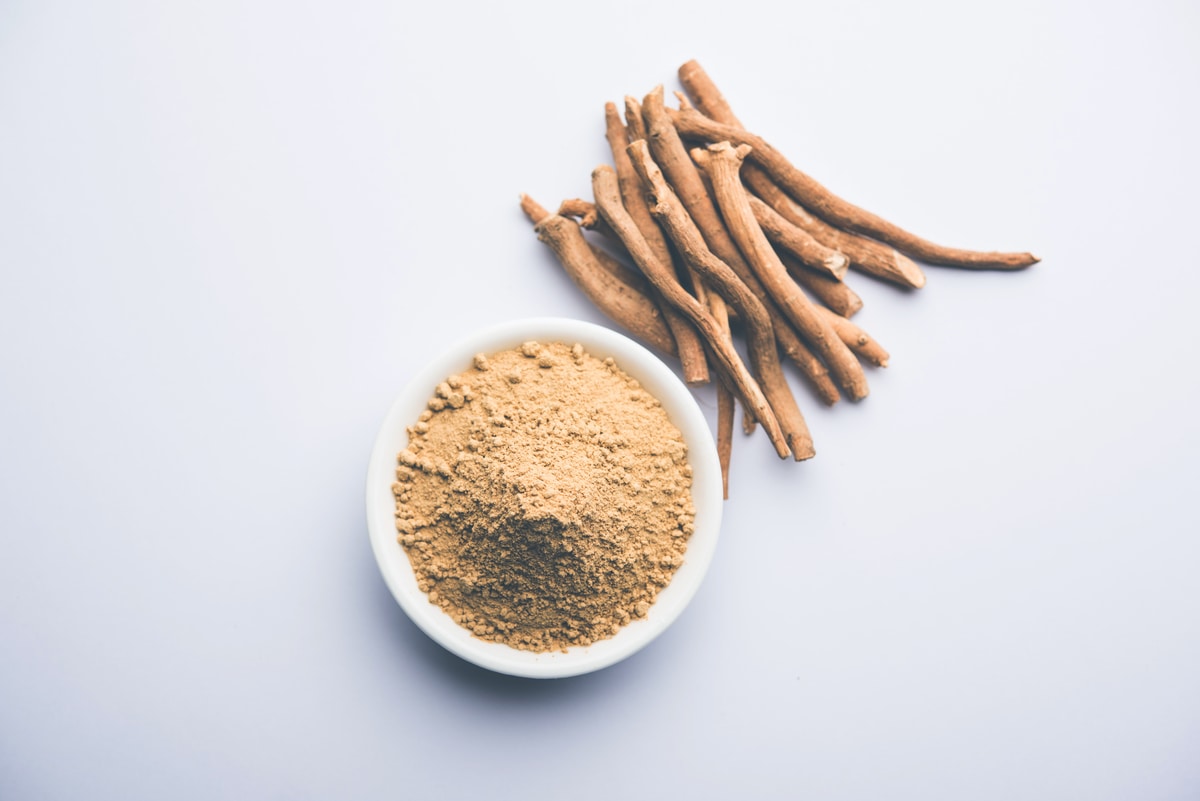Ashwagandha (Withania somnifera) is perhaps the most well-known Ayurvedic herb in the US after turmeric and moringa. We have written about the benefits of turmeric and moringa for new moms in the past, but Ashwagandha is an absolute rock star of Ayurvedic herbs which has some amazing benefits for fertility and postpartum.
Ashwagandha root has been used in Ayurveda for hundreds of years as a rejuvenative and is now a known adaptogen, which means it can help the body resist stress of all kinds naturally by adapting to the body's needs. The word Ashwagandha literally means 'smell of a horse', but is often related more to 'strength of a horse' due to its ability to support strength & vitality [1]. Among the other well-known benefits of Ashwagandha are its ability to support healthy sleeping patterns[2], reduce stress[3], and support immune system[2] and healthy reproductive systems for both men and women[4].
For women, Ashwagandha root can be especially beneficial during conception, pregnancy and postpartum. Let's look at its benefits in each phase.
Fertility and conception
Ashwagandha's ability to reduce stress helps in supporting women's reproductive system. Stress can play an important role in regulating female hormones. The stress hormone, aka cortisol, can reduce progesterone levels and negatively impact fertility and healthy menstruation cycles. By reducing cortisol levels, enhancing the production and flow of blood, and reducing body tension, Ashwagandha has a positive effect on the reproductive system, libido and menstrual cycles. With all these benefits, It is not a surprise that studies have found Ashwagandha to improve female fertility[5].
Ashwagandha's fertility-boosting powers are not limited to women, thankfully. Based on research, ashwagandha may increase testosterone levels and boost sex drive in men. It is used to also increase sperm count.
If you are TTC, Ashwagandha is a must-have ingredient in your fertility supplements. Make sure, you get the one tested for heavy metals like Osh Wellness Women's Fertility Support.
Pregnancy

Ashwagandha has traditionally been used during pregnancy in Ayurvedic practice. It is believed to give strength and vitality to the mother and the fetus, when taken in controlled portions (Ayurveda recommends 1/2 tsp per day). However, there are varied opinions on its use during pregnancy due to its ability to induce abortion in animals when given in very large doses. It is best to consult your OB/GYN if you are pregnant and considering consuming Ashwagandha.
Postpartum and breastfeeding
Ashwagandha root has several beneficial properties for postpartum and breastfeeding mothers which warrant making it a staple.
- Reduces stress and anxiety: Being a new mother can be overwhelming, and stress/anxiety are very common in the postpartum period. Ashwagandha's ability to balance cortisol (stress inducing hormone) helps in reducing stress and anxiety[6] and bring in a little calm.
- Restful sleeping: A full nights sleep can be a distant dream in the first few months as a new mom. However, ashwagandha can help if you are having trouble falling asleep after getting up at night for feeding or sleeping the baby[7].
- Rebuilds strength and vitality: Ashwagandha root has been used to promote strength, energy and vitality, which is why it has long been used as a restorative[8]. These properties can be very useful for new mothers in regaining their strength, maintaining energy levels during the day and avoiding fatigue.
- Immunity booster: Ashwagandha's antioxidant, anti-inflammatory and stress reducing properties also make it a natural immunity booster[2] which can give a much needed support to the new mother's weakened immune system.
- Increase milk production: Ashwagandha has been used in Ayurveda to boost milk production since long, which is likely to be a side benefit of lower stress levels. High stress and anxiety can have negative impacts on milk supply indirectly since the mother may not be eating right or drinking enough water or not nursing frequently because of it.
Note that ashwagandha balances and strengthens the body over time and with regular use. While it is a potent herb with real benefits, it may take a few days before you start noticing them.

Side effects
Although ashwagandha is generally well tolerated in typical doses, mild side effects like upset stomach, headache and sleepiness have been reported in some studies and associated with higher dose. It can also lower blood pressure and blood sugar, and increase thyroid hormone levels which may make it unfit for people who have conditions related to blood pressure, diabetes, or thyroid. Please consult your primary healthcare practitioner to make sure Ashwagandha is safe for you to consume
How much ashwagandha to consume
Women trying to conceive and new mothers may consume 1/4 to 1 tsp Ashwagandha powder daily. This is slightly less than typical dosage of 1-2 tsp for a healthy adult. Like any other herb, starting with a smaller amount and increasing slowly is best.
Freshly Moms Golden Milk contain less than 1/3 tsp Ashwagandha per serving, which works perfectly in tandem with other ingredients to support fertility, breastfeeding and stress relief.
Article continues below ...
How to consume ashwagandha
Check out some delicious ashwagandha recipes here.
Ashwagandha root powder has traditionally been consumed by mixing it with equal parts ghee and honey, and a pinch of cardamom powder. It can also be can be mixed with warm water or milk and honey and consumed before bedtime to promote restful sleep. The versatile powder can even be added to smoothies, coffee, food or anything else you like. There are several supplement pills available too if you prefer that route.
Ashwagandha powder or cut root can also be had as a tea with some honey. A blend of ashwagandha root, nettle leaf and raspberry leaves can function together to support healthy lactation, hormonal balance and sense of well-being.
Conclusion
Ashwagandha's numerous benefits makes it an excellent herb for fertility and postpartum recovery. Regular consumption in limited quantity can help alleviate stress, boost immunity, regulate hormones, improve sleep quality, and rebuild strength. For using it during pregnancy, it is best to consult your doctor.
References
- https://www.ncbi.nlm.nih.gov/pubmed/26609282
- Simon, David and Deepak Chopra. The Chopra Center Herbal Handbook. Three Rivers Press, New York; 2000. 200-202.
- https://www.ncbi.nlm.nih.gov/pubmed/19789214
- https://www.hindawi.com/journals/bmri/2015/284154/abs/
- https://www.ncbi.nlm.nih.gov/pubmed/23439798
- https://www.wellandgood.com/good-advice/best-herbs-for-postpartum-adrenal-fatigue-treatment/
- https://www.ncbi.nlm.nih.gov/pmc/articles/PMC4658772/








